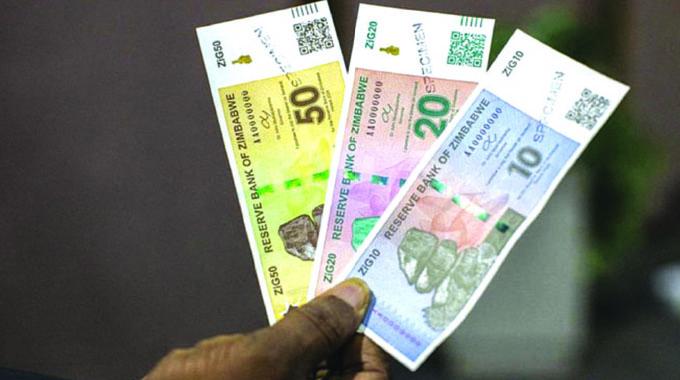News / Local
Mnangagwa's govt in a fix as ZiG is rejected
18 Sep 2024 at 07:30hrs |
0 Views

The Zimbabwean government's efforts to promote the use of the Zimbabwe Gold (ZWG) currency have hit a major hurdle, as wheat farmers have refused to accept payment in local currency for their deliveries, demanding US dollars instead. This development threatens to undermine the government's push to stabilise the currency and strengthen forex reserves, NewsDay has learned.
Farmers rejected ZWG payments due to the sharp depreciation of the local currency, which has lost over 40% of its value since its introduction in April. The ZWG was intended to curb currency instability and hyperinflation but has failed to gain widespread acceptance.
Faced with growing discontent among farmers, the government relented, agreeing to pay for wheat in US dollars to avoid potential shortages. In a circular dated September 13, 2024, Grain Marketing Board (GMB) chief executive officer Edison Badarai confirmed the move.
"GMB advises all its valued farmers and stakeholders that the winter wheat marketing price has been approved with 100% payment in USD currency," Badarai said. He noted that prices would range from US$450 to US$470 per metric tonne, depending on the wheat grade.
The payment shift is seen as a blow to the government's broader economic strategy, as it relies on retaining some forex earnings through local currency payments. Experts warn that paying farmers in US dollars could lead to further rejection of the local currency by other sectors, weakening Zimbabwe's forex reserves.
Last season, farmers were paid 75% in US dollars and 25% in local currency for their wheat. However, amid rising farming costs and fears of losses, they insisted on full payment in USD this year.
Former Zimbabwe Commercial Farmers Union president Wonder Chabikwa expressed relief at the decision, saying it would help ease farmers' financial burdens. "We need foreign currency to recapitalise our farms, and most service providers require payment in USD," Chabikwa said.
Economist Gift Mugano criticised the government's handling of the situation, arguing that the move undermined confidence in the ZWG. "By paying 100% in US dollars, the government is essentially rejecting its own currency," Mugano said. He added that this decision was likely influenced by policymakers who are themselves farmers.
The ZWG, initially trading at 1:13.50 against the US dollar, has since devalued to between 1:25 and 1:30 on the black market, with some services now being priced exclusively in USD. The lack of trust in the local currency remains a major issue, with memories of the hyperinflation crisis of 2008 still fresh.
While the government's decision may temporarily ease tensions with farmers, it raises concerns about the long-term viability of the ZWG and the broader economy. Social commentator Maxwell Saungweme said the farmers' demand for US dollar payments reflected a lack of confidence in the local currency.
"By agreeing to pay in US dollars, the government is admitting that the ZWG is not a viable currency," Saungweme noted.
The government's next steps in addressing the currency crisis remain to be seen, but this latest development signals a significant challenge in its efforts to stabilise the economy.
Farmers rejected ZWG payments due to the sharp depreciation of the local currency, which has lost over 40% of its value since its introduction in April. The ZWG was intended to curb currency instability and hyperinflation but has failed to gain widespread acceptance.
Faced with growing discontent among farmers, the government relented, agreeing to pay for wheat in US dollars to avoid potential shortages. In a circular dated September 13, 2024, Grain Marketing Board (GMB) chief executive officer Edison Badarai confirmed the move.
"GMB advises all its valued farmers and stakeholders that the winter wheat marketing price has been approved with 100% payment in USD currency," Badarai said. He noted that prices would range from US$450 to US$470 per metric tonne, depending on the wheat grade.
The payment shift is seen as a blow to the government's broader economic strategy, as it relies on retaining some forex earnings through local currency payments. Experts warn that paying farmers in US dollars could lead to further rejection of the local currency by other sectors, weakening Zimbabwe's forex reserves.
Last season, farmers were paid 75% in US dollars and 25% in local currency for their wheat. However, amid rising farming costs and fears of losses, they insisted on full payment in USD this year.
Former Zimbabwe Commercial Farmers Union president Wonder Chabikwa expressed relief at the decision, saying it would help ease farmers' financial burdens. "We need foreign currency to recapitalise our farms, and most service providers require payment in USD," Chabikwa said.
Economist Gift Mugano criticised the government's handling of the situation, arguing that the move undermined confidence in the ZWG. "By paying 100% in US dollars, the government is essentially rejecting its own currency," Mugano said. He added that this decision was likely influenced by policymakers who are themselves farmers.
The ZWG, initially trading at 1:13.50 against the US dollar, has since devalued to between 1:25 and 1:30 on the black market, with some services now being priced exclusively in USD. The lack of trust in the local currency remains a major issue, with memories of the hyperinflation crisis of 2008 still fresh.
While the government's decision may temporarily ease tensions with farmers, it raises concerns about the long-term viability of the ZWG and the broader economy. Social commentator Maxwell Saungweme said the farmers' demand for US dollar payments reflected a lack of confidence in the local currency.
"By agreeing to pay in US dollars, the government is admitting that the ZWG is not a viable currency," Saungweme noted.
The government's next steps in addressing the currency crisis remain to be seen, but this latest development signals a significant challenge in its efforts to stabilise the economy.
Source - newsday
Join the discussion
Loading comments…

































